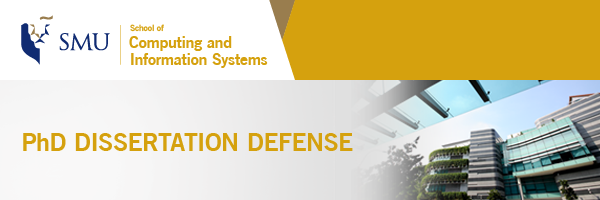|
|
 | | | Sequential Recommendation: From Representation Learning to Reasoning |  | WANG Lei PhD Candidate
School of Computing and Information Systems
Singapore Management University
| Research Area Dissertation Committee Research Advisor Dissertation Committee Member External Member - Kwan Hui LIM, Assistant Professor, Information Systems Technology and Design Pillar, Singapore University of Technology and Design
|
| | Date 29 April 2024 (Monday) | Time 1:00pm – 2:00pm | Venue Meeting room 4.4, Level 4
School of Computing and Information Systems 1, Singapore Management University, 80 Stamford Road Singapore 178902 | Please register by 28 April 2024. We look forward to seeing you at this research seminar. 
|
|
|
| | ABOUT THE TALK The recommender system is a crucial component of today's online services. It helps users navigate through an overwhelmingly large number of items and discovering those that interest them. Unlike general recommender systems, which recommend items based on the user's overall preferences, sequential recommender systems consider the order of user-item interactions. Sequential recommendations aim to predict the next item a user will interact with, given a sequence of previously interacted items, while considering the short-term and long-term dependencies among items.
In this thesis, we focus on sequential recommendation methods: from representation learning to large language model (LLM)-based reasoning. On the one hand, representation learning-based sequential recommendation methods usually feed ID embeddings of interacted items into models, such as deep neural networks, to generate user representation vectors. They then rank candidate items to create a recommendation list based on the similarity between user representation vectors and candidate item vectors. On the other hand, the LLM-based reasoning approach mainly depend on the LLM's strong reasoning ability and rich world knowledge. When using LLM-based reasoners, it requires carefully designed prompts and/or demonstration examples considering the task complexity and prompt length constraint.
This thesis consists of three parts. In the first part, we aim to improve representation learning for sequential recommendation and present our efforts in building an explanation-guided contrastive learning sequential recommendation model. In the second part, we investigate how we can build sequential recommendation models based on the recent success of large language models. In particular, we introduce two new research directions for LLM-based sequential recommendation: 1) zero-shot LLM-based reasoning of recommended items and 2) few-shot LLM-based reasoning of recommended items. In the final part, we address the explanation generation task and the evaluation of explanation for sequential recommendation results using LLMs. Specifically, we introduce a framework for LLM-based explanation that can support an automatic evaluation of an LLM's ability to generate plausible post-hoc explanations from the content filtering and collaborative filtering perspectives. | | | ABOUT THE SPEAKER WANG Lei is a PhD candidate in Computer Science at SMU School of Computing and Information System, under the supervision of Prof. LIM Ee-Peng. His primary research interests lie in large language models and sequential recommendations. His work includes improving representation learning-based sequential recommendations and large language model-based sequential recommendations. Prior to joining SMU, WANG Lei earned a Bachelor's degree in Electrical Engineering and a Master's degree in Computer Science from the University of Electronic Science and Technology of China.
|
|
|
|
|
|